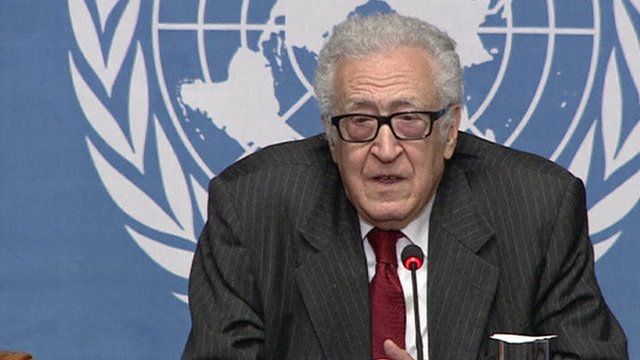The UN-Arab League envoy on Syria has said that a peace conference he had hoped to hold in Geneva this month has been delayed but he is still “striving” for a summit by the end of the year.

Lakhdar Brahimi said after a day of meetings with senior diplomats that he was not able to announce a date.
Attempts to set up a conference have been going on for months amid disputes over who should attend and its agenda.
Mr Brahimi said he would meet US and Russian diplomats again on 25 November.
“We were hoping that we’d be in a position to announce a date today, unfortunately we’re not,” he told reporters.
“But we’re still hoping that we’ll be able to have the conference before the end of the year.”
The envoy added that “nothing dramatic” had happened at Tuesday’s talks and the failure to agree a date had been expected for several weeks.
Mr Brahimi held talks with US Under-Secretary of State Wendy Sherman and Russian deputy foreign ministers Mikhail Bogdanov and Gennady Gatilov, then later with the other permanent members of the UN Security Council – the UK, France and China – as well as Syria’s neighbours Lebanon, Iraq, Jordan and Turkey.
The idea of a conference was first mooted in May, and in September UN Secretary General Ban Ki-moon announced a tentative date of mid-November after the Security Council passed a binding resolution on Syrian chemical weapons.
Mr Brahimi said Mr Ban continued to be “impatient” to have a conference, saying that the situation was getting worse with 6,000 people leaving the country every day.
Aid agencies have warned that more than nine million Syrians, almost half the population, are now in need of humanitarian relief.
Difficulty over Iran
Only Syria’s government and opposition groups can reach a peace deal and make it stick – but the stumbling blocks are large, says the BBC’s Imogen Foulkes in Geneva.
The opposition is divided, the Syrian government does not appear ready to talk about a transition and, it seems, the US and Russia still do not agree on whether Syria’s key regional neighbour Iran should be present.
The Syrian government expects to take part in eventual negotiations, while the opposition says Syrian President Bashar al-Assad should step down first.
But presidential adviser Bouthaina Shaaban told the BBC the issue of Mr Assad’s departure was not on the table and he would only go if voted out of office.
“I think this would be left to the Syrian people to discuss and decide. I don’t think the issue is about power now,” she said.
The UN estimates that more than two million people have fled Syria since the unrest began in March 2011 resulting in a humanitarian crisis.
Most have sought refuge in Lebanon, Jordan, Turkey, Iraq and Egypt.
More than 100,000 people are estimated to have been killed since the conflict began.
BBC















